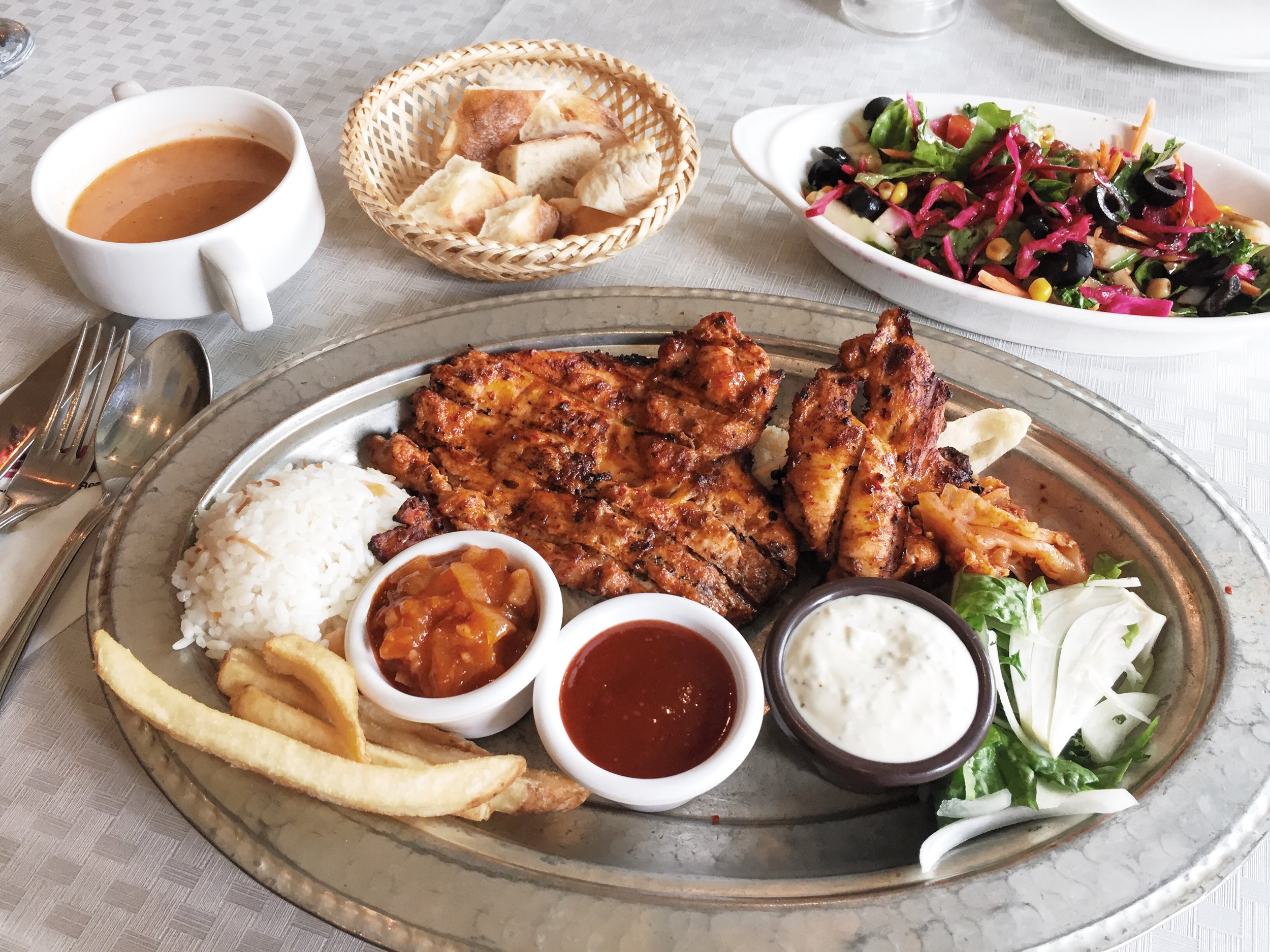FEATURED PHRASES:
*the following phrases are formal (unless stated otherwise), so use towards elders and strangers.
요즘 날씨 어때요?
Yojeum nalsshi eoddaeyo?
How’s the weather these days?
(Informal: 요즘 날씨 어때?)
좋아요.
Joayo.
It’s good. (also: I like it.)
(Informal: 좋아.)
추워요.
Chuwoyo.
It’s cold.
(Informal: 추워.)
따뜻해요.
Ddaddeuthaeyo.
It’s warm.
(Informal: 따뜻해.)
더워요.
Duhwoyo.
It’s hot.
(Informal: 더워.)
습해요.
Seubhaeyo.
It’s humid.
(Informal: 습해.)
You can add in AJOO (아주) in front of the previous phrases. AJOO means “so.”
아주 좋아요. It’s so good. Ajoo joayo.
아주 추워요. It’s so cold. Ajoo chowoyo.
아주 따듯해요. It’s so warm. Ajoo ddaddeuthaeyo.
아주 더워요. It’s so hot. Ajoo duhwoyo.
아주 습해요. It’s so humid. Ajoo seubhaeyo.
You can add in NALSSHI (날씨) to be more noun-specific with your phrases. NALSSHI means “weather.”
날씨 좋아요. The weather is good. Nalsshi joayo.
날씨 추워요. The weather is cold. Nalsshi chuwoyo.
날씨 따뜻해요. The weather is warm. Nalsshi ddaddeuthaeyo.
날씨 더워요. The weather is hot. Nalsshi duhwoyo.
날씨 습해요. The weather is humid. Nalsshi seubhaeyo.
아침엔 영하 5도예요.
Achimen yongha ohdoyeyo.
It’s -5 degrees in the morning.
(Informal: 아침엔 영하 5도야.)
DOH (도) means degrees. YONGHA (영하) means negative. Anytime you want to say “negative something degrees” add YONGHA before the number. By the way, Korea uses Celcius, not Fahrenheit.
오후엔 33도예요.
Ohuen samshipsam doyeyo.
It’s 33 degrees in the afternoon.
(Informal: 오후엔 33도야.)
Remember, Korea has two number systems. Use the Sino-Korean number system when talking about temperature.
밤엔 8도예요.
Bamen paldoyeyo.
It’s 8 degrees at night.
(Informal: 밤엔 8도야.)
For the previous three phrases, replace the number before DOH (도) for other temperatures.
Other variations on asking about the weather:
오늘 날씨 어때요?
Oneul nalsshi eoddaeyo?
How’s the weather today?
(Informal: 오늘 날씨 어때?)
내일 날씨 어때요?
Naeil nalsshi eoddaeyo?
How’s the weather tomorrow?
(Informal: 내일 날씨 어때?)
For other times and places, replace the noun before “nalsshi eoddaeyo?”
이번주 날씨 어때요?
Ebeonju nalsshi eoddaeyo?
How’s the weather this week?
(Informal: 이번주 날씨 어때?)
서울 날씨 어때요?
Seoul nalsshi eoddaeyo?
How’s the weather in Seoul?
(Informal: 서울 날씨 어때?)
부산 날씨 어때요?
Busan nalsshi eoddaeyo?
How’s the weather in Busan?
(Informal: 부산 날씨 어때?)
캘리포니아 날씨 어때요?
Calliponia nalsshi eoddaeyo?
How’s the weather in California?
(Informal: 캘리포니아 날씨 어때?)
Time for some present tense phrases for you to answer with:
비 와요.
Bi wayo.
It’s raining.
(Informal: 비 와.)
눈 와요.
Noon wayo.
It’s snowing.
(Informal: 눈 와.)
Perhaps it’s snowing and raining tons? Just add MANEE (많이) before WAYO (와요). MANEE means "a lot."
눈 많이 와요.
Noon manee wayo.
It’s snowing a lot.
(Informal: 눈 많이 와.)
비 많이 와요.
Bi manee wayo.
It’s raining a lot.
(Informal: 비 많이 와.)
But maybe it’s windy?
바람 불어요.
Baram buluhyo.
It’s windy.
(Informal: 바람 불어.)
Or perhaps it's REALLY windy?
바람 많이 불어요.
Baram manee buluhyo.
It’s very windy.
(Informal: 바람 많이 불어.)
Here are future tense phrases:
비 온대요.
Bi ondaeyo.
It’s going to rain.
(Informal: 비 온대.)
눈 온대요.
Noon ondaeyo.
It’s going to snow.
(Informal: 눈 온대.)
You can add MANEE (많이) to these phrases, too. Remember, MANEE means “a lot.”
비 많이 온대요.
Bi manee ondaeyo.
It’s going to rain a lot.
(Informal: 비 많이 온대.)
눈 많이 온대요.
Noon manee ondaeyo.
It’s going to snow a lot.
(Informal: 눈 많이 온대.)
BONUS PHRASES!
*not featured in the video
어떤 날씨가 좋아요?
Eoddeun nalsshiga joayo?
What kind of weather do you like?
(Informal: 어떤 날씨가 좋아?)
전 더운 날씨가 좋아요.
Jeon deoun nalsshiga joayo.
I like hot weather.
(Informal: 난 더운 날씨가 좋아.)
전 추운 날씨가 좋아요.
Jeon chuoon nalsshiga joayo.
I like cold weather.
(Informal: 난 추운 날씨가 좋아.)
전 비 오는 날이 제일 좋아요.
Jeon bi oneun nalee jaeil joayo.
The days I like the most is when it rains.
(Informal: 난 비 오는 날이 제일 좋아.)
전 바닷가를 좋아해서 여름이 최고예요.
Jeon badatgaleul joahaesuh yeoreumee chwaegoyeyo.
I like the beach, so summer is the best.
(Informal: 난 바닷가를 좋아해서 여름이 최고야.)
비 오네요. 파전이랑 막걸리 먹으러 갈까요?
Bi onaeyo. Pajeonelang makeolli mugeuruh galgayo?
It’s raining. Shall we go eat Korean pancakes and makeolli?
(Informal: 비 오네. 파전이랑 막걸리 먹으러 갈까?)
You can replace “PAJEON AND MAKEOLLI” with soju and samgyeopsal.
삼겹살과 소주 먹으러 갈까요?
Samgyeopsalgwa soju mugeuruh galggayo?
Shall we go eat pork belly and soju?
(Informal: 삼겹살과 소주 먹으러 갈까?)
치맥하러 갈까요?
Chimek mugeuruh galggayo?
Shall we go eat chimek (chicken and beer)?
(Informal: 치맥하러 갈까?)
그럴까요?
Geureolggayo?
Shall we?
(Informal: 그럴까?)
Some words that you’ll hear on the news forecast:
계절 / gyejeol / season
여름 / yeoreum / summer
가을 / gaeul / autumn
겨울 / gyeoul / winter
봄 / bom / spring
날씨 / nalsshi // weather
비 / bi // rain
눈 / noon // snow
우박 / oobak // hail
안개 / ahngae // fog
무지개 / mujigae // rainbow
쌍무지개 / ssangmujigae // double rainbow












